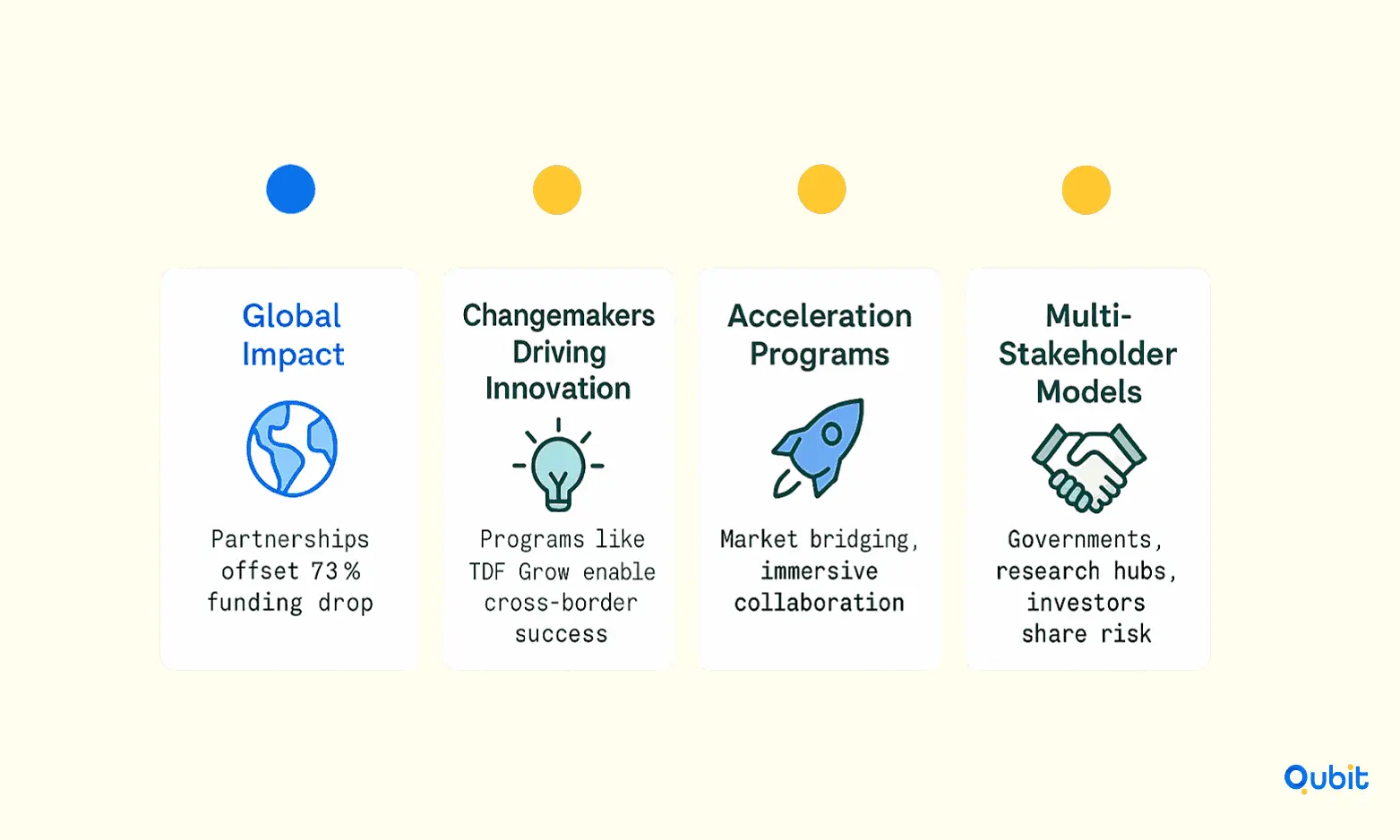The FoodTech industry faces a critical funding challenge, with AgriFoodTech investments plummeting by 73%—from $61.2 billion in 2021 to $16.1 billion in 2024. This stark decline underscores the urgent need for innovative solutions to sustain growth and innovation. Strategic corporate partnerships offer a promising path forward, enabling startups to access resources, expertise, and market opportunities that traditional funding avenues may no longer provide.
Your exploration of strategic corporate partnerships naturally connects with how to secure funding for agritech startups, offering a comprehensive backdrop on funding structures within the FoodTech sector. By understanding these partnerships, startups can unlock new opportunities to thrive in a challenging financial landscape. Let’s jump right in.
Why Strategic Corporate Partnerships Matter Now
Corporate partners provide more than capital. They offer access to supply chains, expertise, customers, and distribution infrastructure, advantages that have become even more significant as food and ag-tech startups adapt to tighter investment conditions. With macroeconomic headwinds and investor scrutiny intensifying, these partnerships now serve as major validation points for venture investors as well.

Global Impact & Corporate Partnerships
The FoodTech industry is undergoing a transformative phase, where global initiatives and corporate collaborations are stepping in to address funding challenges. Despite a staggering 73% drop in AgriFoodTech investments, from $61.2 billion in 2021 to $16.1 billion in 2024, strategic partnerships are proving to be a lifeline for innovation. These collaborations span changemakers, acceleration programs, government initiatives, and multi-stakeholder alliances, creating opportunities for scalable solutions.
Changemakers Driving Innovation
Changemakers in FoodTech are redefining the industry by fostering partnerships that transcend borders. Programs like the TDF Grow F&B Accelerator program exemplify this approach. This initiative, based in Saudi Arabia, focuses on driving innovation within the Food Service industry. By connecting startups with corporate resources, it provides a model for how businesses can thrive even in challenging financial climates.
Acceleration Programs and Market Bridging
Acceleration programs are playing a pivotal role in bridging markets and fostering international collaboration. For instance, Desafía Foodtech UK connects Spanish startups with British industry leaders, offering an immersive experience that facilitates cross-border innovation. Such programs not only expand market access but also help startups overcome funding gaps by aligning them with established players.
Multi-Stakeholder Collaborations
The rise of multi-stakeholder innovation is reshaping the FoodTech landscape. By involving governments, research hubs, and investors alongside corporations, these partnerships distribute risk and accelerate scalable solutions. This approach ensures that innovation is not solely reliant on private funding but benefits from a diverse pool of resources and expertise.
In 2025, investors and corporates alike are placing added value on startups that deliver pragmatic solutions to urgent industry pain points, especially labor shortages, supply chain inefficiency, sustainability goals, and new regulatory demands.
Models of Strategic Corporate Partnerships
1. Pilot-to-Scale Collaborations
Many FoodTech startups begin with pilot projects inside a corporate partner’s operations. The most successful go beyond short-term pilots, moving toward recurring commercial contracts or full-scale deployments. These “pilot-to-scale” partnerships give startups vital income, product validation, and feedback while allowing corporates to derisk innovation before wider rollout.
2. Equity Investment and Joint Ventures
Corporates may provide direct funding, sometimes as part of a larger syndicate or through their corporate venture arms, to startups aligned with their strategic goals. This can take the form of minority equity stakes, convertible notes, or even joint ventures targeting new product categories, geographies, or technologies.
3. Distribution and White-Label Arrangements
For consumer-facing or ingredient-based FoodTech startups, partnerships with food manufacturers, distributors, or quick-service restaurant chains allow rapid market entry and volume growth that would be infeasible independently.
4. Co-Development and R&D Partnerships
Corporates with substantial R&D arms may collaborate with startups to accelerate innovation, develop proprietary solutions, and share IP. This is particularly common in alternative proteins, ag-biotech, and packaging innovation.
Investor Insights and Opportunities
Investors looking to make informed decisions in the FoodTech sector gain access to our deep industry knowledge and strategic insights. An analysis of foodtech venture capital firms interweaves insights into investor roles, providing a broader perspective on funding dynamics within the FoodTech landscape.
Through these diverse services, we aim to create a thriving FoodTech ecosystem that benefits all stakeholders.
Key Elements of Successful Partnerships
Strong corporate partnerships thrive on a foundation of shared goals, strategic planning, and mutual commitment. To ensure success, businesses must prioritize three essential elements: budget allocation, resource commitment, and a shared long-term vision.
1. Strategic Budget Allocation
Effective partnerships often begin with a clear understanding of financial expectations. Allocating the right budget ensures that both parties can invest in the tools, technologies, and personnel needed to achieve their objectives. For example, the collaboration between Tyson Foods and Future Meat Technologies demonstrates how strategic investment can overcome barriers.
High production costs for cultivated meat were tackled through their partnership, resulting in a remarkable 99% cost reduction in lab-grown chicken production. This case highlights the importance of financial planning in driving innovation and scalability.
2. Resource Commitment
Beyond monetary investment, successful partnerships require dedicated resources, including time, expertise, and infrastructure. Both parties must be willing to contribute their strengths to achieve shared goals. Whether it's technical expertise, operational support, or market access, resource commitment ensures that the partnership remains balanced and productive.
3. A Shared Long-Term Vision
A unified vision is the cornerstone of any enduring partnership. Aligning on long-term objectives allows businesses to navigate challenges collaboratively and remain focused on their ultimate goals. This shared vision fosters trust and ensures that both parties are working toward a common purpose, rather than pursuing conflicting priorities.
To explore complementary financing methods that can supplement corporate investments, check out our insights on debt financing agritech. This approach broadens your view of non-dilutive capital strategies for scaling AgriTech operations. By focusing on these key elements, businesses can build partnerships that drive innovation, reduce costs, and achieve sustainable growth.
Navigating Challenges
Startups often face a complex web of obstacles when attempting to establish corporate partnerships. From misaligned goals to resource constraints, these challenges can hinder progress and stall growth. Understanding these hurdles is the first step toward overcoming them effectively.
1. Misaligned Objectives
One of the most common barriers is the mismatch between a startup’s goals and the priorities of potential corporate partners. Startups often focus on innovation and rapid scaling, while corporations may prioritize risk mitigation and long-term stability. To bridge this gap, startups should invest time in understanding the corporate partner’s strategic vision and tailor their pitch accordingly.
2. Resource Limitations
Limited resources, whether financial, human, or technological—can make it difficult for startups to meet the demands of corporate partnerships. For instance, startups may struggle to deliver on large-scale projects due to insufficient infrastructure. Exploring alternative funding approaches, such as series a funding agritech, can help startups secure the growth capital needed to overcome these limitations. The overview is further enriched by series a funding agritech, which elaborates on growth capital tactics and complements the strategic discussion on corporate partnerships.
3. Navigating Bureaucracy
Corporate entities often have intricate decision-making processes that can slow down collaboration. Startups should focus on identifying key stakeholders early and building relationships with decision-makers to streamline communication and approvals.
4. Lack of Credibility
Corporations may hesitate to partner with startups due to concerns about reliability and scalability. Building credibility through proven results, testimonials, and a strong track record can help startups overcome this perception.
By addressing these challenges head-on, startups can position themselves as valuable partners and unlock opportunities for growth and innovation.
Proof of Traction: Why Corporate Relationships Attract VC
For early- or growth-stage FoodTech startups, showing a strategic corporate partnership on the cap table or in the sales pipeline significantly increases credibility with venture capitalists.
Investors now view recurring revenues, clear KPIs, and even path-to-M&A via corporate collaboration as “table stakes” for funding consideration. In a funding climate marked by rationalization and maturity, these partnerships are essential proof points. Check monetization strategies for agri/foodtech to stack MRV revenue, partnerships, and channel-led growth.
Key Strategic Partnership Examples
| Partnership Model | Example (2025) | Impact |
|---|---|---|
| Distribution Deal | Alternative protein startup partners with QSR chain | Entry into thousands of locations, rapid volume |
| Equity + R&D JV | Ag-biotech startup & global seed company | Co-developing climate-resilient seeds |
| Pilot-to-Recurring | Food Waste AI solution pilots at major retailer, scales | From proof-of-concept to contracted deployment |
What Startups Need to Prepare
- Clear business fundamentals: Strong margins, commercial traction, and evidence of market fit are non-negotiable; recurring revenue from partnerships is a key metric.
- Open, collaborative mindset: Corporate partnerships require patience, regulatory readiness, and clear negotiation around IP and data sharing.
- Exit and Funding Optionalities: Startups should structure relationships to allow for subsequent investment rounds or strategic exits—many partnerships are now structured to enable smooth M&A if the alliance proves successful.
Conclusion
Strategic corporate partnerships play a vital role in addressing the funding challenges faced by FoodTech startups. These collaborations not only provide financial support but also open doors to shared resources, innovative solutions, and global networks. By prioritizing initiatives that align with long-term goals, allocating budgets effectively, and committing resources to mutual growth, startups can build partnerships that drive sustainable success.
To make the most of these opportunities, it’s essential to adopt a forward-thinking approach, focusing on strategies that foster trust and shared vision. Whether it’s through global initiatives or resource-sharing agreements, the right partnerships can transform challenges into growth opportunities.
If you're ready to elevate your FoodTech corporate partnerships, we at Qubit Capital can assist with our Fundraising Assistance service. Let’s get started today!
Key Takeaways
- Strategic corporate partnerships can effectively bridge funding gaps in FoodTech.
- Global initiatives and innovation models are key drivers for successful collaborations.
- Essential factors include proper budget allocation, dedicated resource commitment, and a shared long-term vision.
- Overcoming challenges requires proactive communication and flexibility.
Frequently asked Questions
What are the benefits of corporate partnerships in foodtech?
Corporate partnerships offer startups essential resources such as capital, market access, and credibility. These collaborations can help startups overcome funding challenges, even amidst declining investment trends in the foodtech sector.






